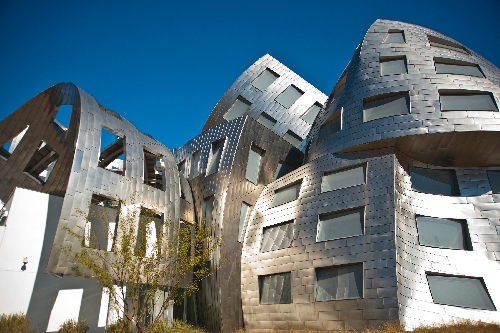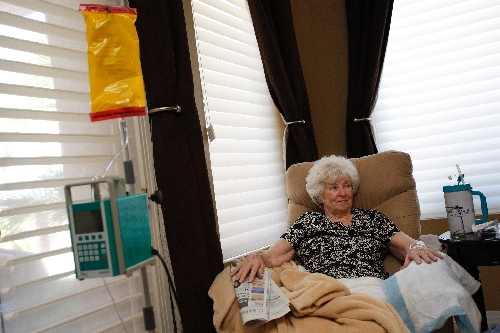Ruvo Center officials seek brain-disease remedies
What do you say about a disease that so wipes out your mother's mind that she can't recognize her own children, that changes her brain in such a way that bowel and bladder control become impossible, that makes her inhale food and liquids into her lungs, leading to a painful, and finally fatal, bout with pneumonia?
I can say that it tears your guts out, that you feel helpless, that you hope that one day soon no one else ever has to suffer with Alzheimer's, the neurological disease that robs people of rational memory and thought.
Three weeks after I buried my mother, who had taken drugs that supposedly slowed down the progression of the disease. I can't help wondering whether hope for a cure is grounded in reality or just wishful thinking.
"Help me," my mother cried repeatedly in her last days in a Michigan hospital, her hand squeezing mine or my brothers' as her mind took her on horrific journeys that left her fearful of the past, present and future in the space of seconds.
Can we unlock the mysteries of the brain that cause the kind of Alzheimer's terror that I saw in my mother's eyes?
The clinicians at the Cleveland Clinic Lou Ruvo Center for Brain Health say we can.
I want to believe them, and yet I know that correcting any problem with the brain is an incredibly difficult fix. I have a son with a neurological disorder that scores of doctors still can't figure out, leaving him largely incapable of higher learning.
The spotlight will turn toward the center this week as it holds its annual fundraising gala Saturday at the MGM Grand Garden Arena. (It's also serving as a 70th birthday celebration for guest of honor Muhammad Ali.) There is no question that what has been accomplished at the Ruvo Center since it opened less than three years ago is impressive. For example, the center is now carrying out more clinical trials of drugs to use against Alzheimer's and other neurocognitive diseases, 20, than any other center in the country.
SEARCHING FOR SOLUTIONS
As Dr. Jeffrey Cummings, the center's director and one of the world's leading Alzheimer's researchers, says, "It only stands to reason that the more trials of drugs you have, the better chance you have of finding those that really work."
The center, which has nine doctors on staff, four of whom see Alzheimer's patients, has even branched into studying professional fighters for head trauma, research that could ultimately let boxers and mixed martial arts fighters know when they should hang up the gloves -- or suffer permanent brain damage.
There's more, so much more, including the hiring of specialists to treat Parkinson's disease and multiple sclerosis. And a Nobel Prize laureate, Dr. Stanley Prusiner, who discovered a new class of proteins that can cause devastating brain diseases in both animal and humans, has become chairman of the center's scientific advisory board.
Perhaps most importantly, the first multisite clinical trial in the United States aimed at trying to identify Alzheimer's through an inexpensive blood test is being directed by the Ruvo Center's Dr. Kate Zhong in Southern Nevada and at two sites in Ohio. A successful trial, involving 165 people, could be a precursor to detecting the disease before memory loss occurs. This would be an important step toward allowing earlier therapeutic interventions to halt or stabilize the disease's progression.
Should the initial trial go as planned, another trial involving as many as 1,000 people from around the country will proceed.
Doctors now largely use brain imaging, psychiatric tests and evaluation of behavior to diagnose the disease. Though these methods are costly, they're neither entirely accurate nor practical to use broadly, experts say.
That the center has already made a name for itself internationally -- symposiums are regularly held that bring the world's top researchers on neurological disorders to Las Vegas -- is due to the respect for the prolific research of Cummings and in no small part to the work of philanthropic businessman Larry Ruvo, who founded and named the facility for his late father, who died of Alzheimer's in 1994.
"This is a man who is driven -- Larry Ruvo has an absolute passion and commitment to do something about the disease," said Dr. Michael Modic, chairman of the Neurological Institute at the Cleveland Clinic in Ohio. "I'm really impressed with his energy, his commitment to fundraising to make this a world-class facility."
GRAND DESIGNS
When Ruvo decided he needed a unique structure to attract more donors and world-class medical researchers, he went to California to call on architect Frank Gehry, who won a worldwide following with daring designs for buildings such as the Walt Disney Concert Hall in Los Angeles and the Guggenheim Museum in Spain. But Gehry, who had refused other requests to design buildings in Las Vegas, quickly told him he wasn't interested, even though Ruvo had a 45-minute appointment.
"I told him he was rude," Ruvo said recently as he gave a tour of the building that has an exterior that some people believe looks like an Alzheimer's-addled brain. "I told him he had to listen me and he did. We ended up talking for three hours and ended up making a deal soon afterward. Now we're friends and we have a building that everyone recognizes around the world."
Anyone who spends any time with Ruvo knows why he is so passionate about creating a world-class center devoted to curing brain disease. It took nearly 18 months of doctors visits and misdiagnoses in Las Vegas during the 1990s before Ruvo's father, Lou, was diagnosed with Alzheimer's in California. And as Angie Ruvo, Lou Ruvo's wife and caregiver, struggled to care for him, she ruptured disks in her back, forcing to have surgery that has left her barely able to walk.
Those experiences, Ruvo said, would drive him not only to raise money for the $80 million institute near downtown Las Vegas, but also to ensure that caregivers' needs were addressed.
CARING ABOUT CAREGIVERS
Counseling sessions are now regularly held for caregivers, some one on one with spouses, others with their friends and family members -- people who can be called on to help shop for groceries or provide rides to medical appointments or to stay with the Alzheimer's patient while the caregiver goes out for a dinner.
"What Larry taught us," Modic said, "is the importance of the caregiver in the disease process. Most people don't think of it. But you have to treat the whole family if you're going to have the highest level of hope."
It was Ruvo's emphasis on addressing the needs of both caregivers and patients -- there is never a wait for patients who have an appointment at the center -- that made a partnership with the Cleveland Clinic make sense in 2009, Modic said.
The Cleveland Clinic is a hospital of nearly 2,000 physicians that U.S. News & World Report ranks fourth best in the country and in the top 10 in 16 specialties nationally, including neurology.
Ruvo had been exploring partnerships with the University of Pennsylvania, the University of California, Los Angeles and Harvard University when Ruvo hit it off with Cleveland Clinic Chief Executive Dr. Delos "Toby" Cosgrove, who was initially in Las Vegas on another business matter in December 2008. By February, they had formed a partnership.
"He said he could make things happen fast, and he has," Ruvo said. "This partnership will make many great doctors want to come to Las Vegas, where they know great medicine is being practiced."
In July, the center announced it attracted two top physician-researchers -- Dr. Timothy West, a specialist in multiple sclerosis and Dr. Ryan Walsh, a specialist in Parkinson's disease and movement disorders -- as it expanded its care outside Alzheimer's.
Their support staffs include physical and occupational therapists. As they have with Alzheimer's patients, social workers help the patients' caregivers. Psychological and nursing help is available for all three degenerative neurological conditions.
The center's reach into the community continues to grow as its staff grows, with 3,314 new patients treated last year alone, bringing the total to nearly 5,000 since 2009. Patient visits have topped the 13,000 mark.
SEEKING 'BABE RUTH' FOR VEGAS
Walsh believes the close collaboration of Alzheimer's, multiple sclerosis and Parkinson's researchers can go a long way toward unlocking the mysteries of brain disease.
"That's something Dr. Cummings promised we would do: work collaboratively," Walsh said. "That's a big reason why I came here."
It was by no means a certainty that Cummings, long established at UCLA, would become involved with the Ruvo Center. But Ruvo, aware that hundreds of scientific papers authored by Cummings are cited by scientists around the world, told Cosgrove, "I've built Yankee Stadium, now I want Babe Ruth."
Cummings said the Cleveland Clinic made him an offer he couldn't refuse -- the promise of running a center with the most clinical trials in the nation. And Ruvo told Cummings that instead of being part of history in Los Angeles, he could make history in Las Vegas.
There is now even the possibility of a collaboration with Chinese health officials, which could mean testing even more patients.
"I want to find out what works," Cummings said. "The Cleveland Clinic is making that possible by allowing as many trials as we can handle."
Las Vegans have enthusiastically supported the Ruvo Center's requests for human subjects for drug trials.
I can never forget meeting with Carol Nowicki just a few weeks before my mother was diagnosed with the disease in 2010.
The white-haired widow, who still plays bridge twice a week, may have had Alzheimer's, but she didn't want her brain to go to waste. Then 79, she sat in her daughter's Las Vegas home and talked about how exciting it was to be part of a drug trial.
"If I can help anybody else, I'm all for it," she said as medication -- or a placebo -- trickled through the IV in her arm. "Those people there are out to find answers. It's nice to be part of that."
Watching her mother, Sandra Starr became emotional.
"Wouldn't it be wonderful," Starr said as she hugged her mother, "if the scientific inroads that end Alzheimer's are made right here in Las Vegas?"
Contact reporter Paul Harasim at pharasim@reviewjournal.com or 702-387-2908.
INSIDE THE GALA
What: "Power of Love Gala" to benefit the Cleveland Clinic Lou Ruvo Center for Brain Health
Where: MGM Grand Garden Arena, 3799 Las Vegas Blvd. South
When: 5:30 p.m. Saturday
On the way: Celebrities slated to appear include Stevie Wonder, Larry King, Samuel L. Jackson, Snoop Dogg, LL Cool J, Common, Lenny Kravitz, Sean Combs, Anthony Hopkins, John Legend, Chris Cornell, Cee Lo Green, Joe Perry, Slash, Terrence Howard, Ken Jeong, David Copperfield, Andre Agassi, Stefanie Graf, Jim Brown, Randy Couture, Brad Garrett, Kelly Rowland, Dave Koz, James Gandolfini, Steve Schirripa, Chazz Palminteri, Haley Reinhart, Raphael Saadiq and Sammy Hagar.
Boxing icons scheduled to attend the celebration include Sugar Ray Leonard, Evander Holyfield, Ken Norton, Tommy "Hitman" Hearns, Roberto Duran and Leon Spinks.
Celebrity chefs are Wolfgang Puck, Michael Mina, Tom Colicchio and Scott Conant.





















